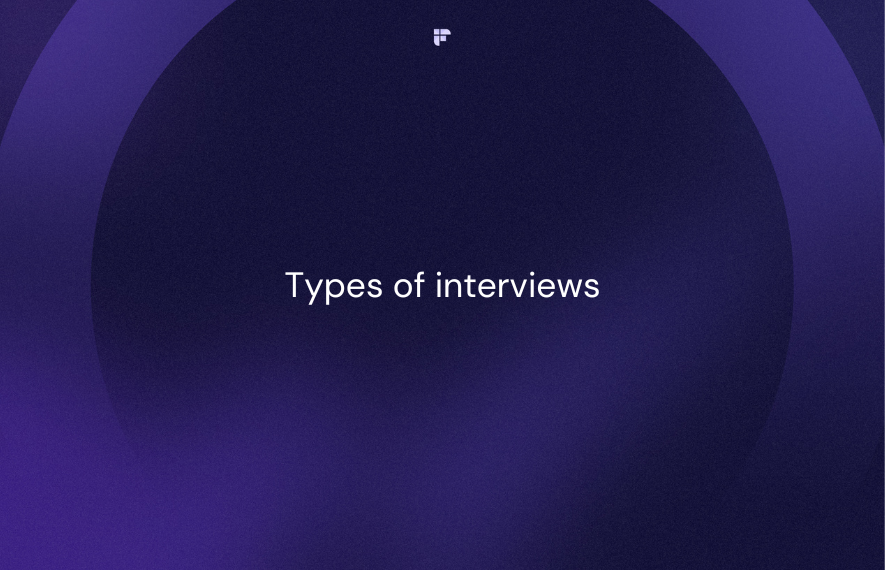Many different types of interviews exist, each with its own unique approach and purpose. However, choosing the right type can be a real head-scratcher. But don't worry, we've got your back.
In this blog, we'll walk you through:
- different types of interviews,
- when to use each,
- their key characteristics, and more.
Whether searching for that ideal team member or collecting essential insights, this blog will help you find the perfect approach for your needs. So, read on!
11 types of interviews
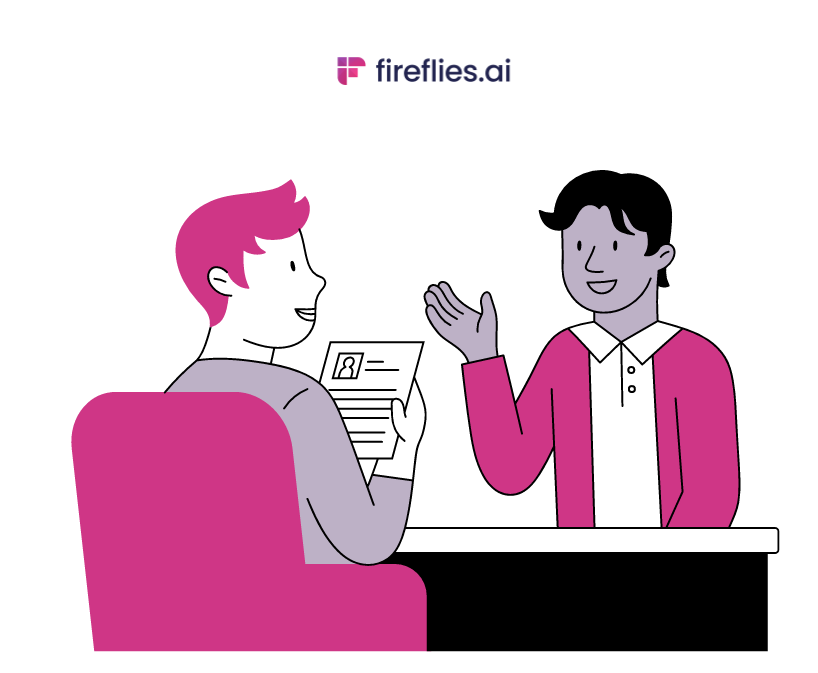
Interviews are a powerful tool for learning, understanding, and connecting with people. But the same type of interview need not fit all situations.
Here are 11 types of interviews you should know:
- Structured interview
- Unstructured interview
- Semi-structured interview
- Behavioral interview
- Situational interview
- Panel interview
- Group interview
- Stress interview
- Phone interview
- Video interview
- Job simulation or case interview
💡 Fireflies Tip
No matter the type of interview you choose, make sure you record it. Recording interviews ease documentation and allow you to focus more on the conversation than note-taking. You can refer to the recording as an accurate source of information in the future, identify conversation trends, and further improve your interview skills and processes.
1. Structured interview
A structured interview is a type of interview where the questions are predetermined and asked in a consistent, standardized manner. All the candidates are asked the same set of questions in the same order, which allows for fair and objective comparisons between candidates.
Using a structured approach, you can collect consistent and reliable information and minimize the potential for bias or subjective interpretations.
Characteristics
- Uses a predetermined set of questions
- Standardized evaluation process
- Fair and objective comparison of candidates
When to use
- When you need a standardized and objective comparison of candidates
- For jobs with clearly defined requirements and responsibilities
- To ensure compliance with legal or organizational guidelines
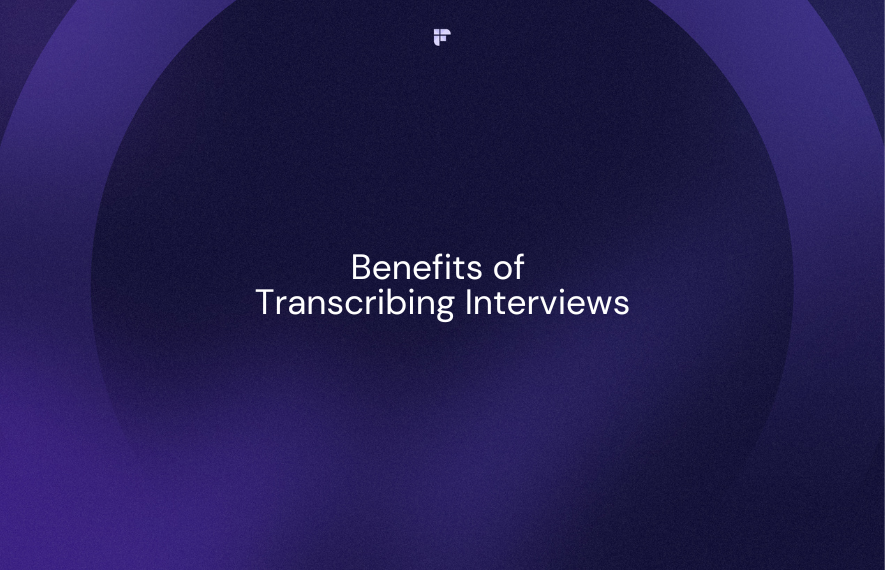
2. Unstructured interview
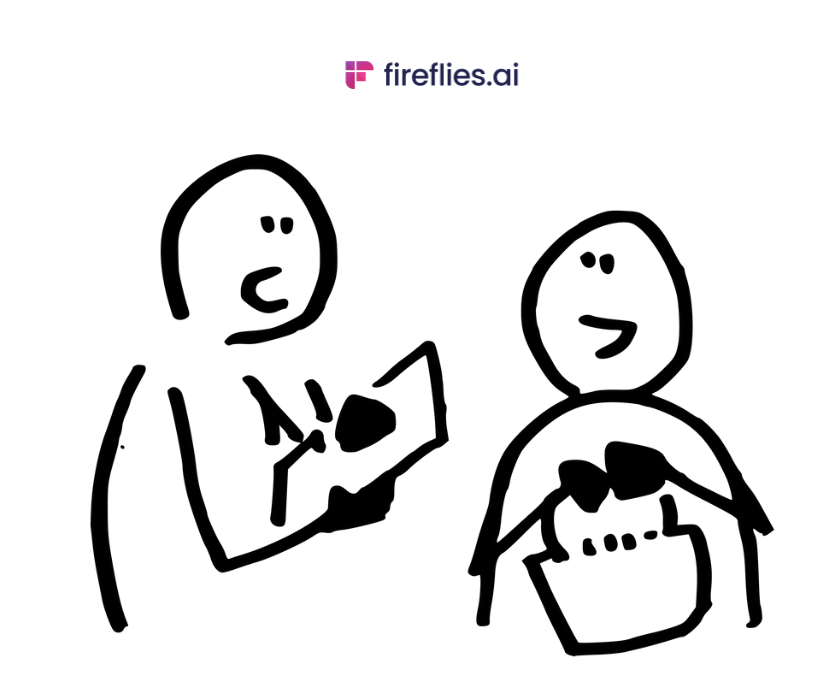
An unstructured interview follows a free-flowing, conversational approach to reveal a candidate's personality and communication style.
You may ask open-ended questions, follow-up questions, or probe deeper into certain topics based on the candidate's responses.
Characteristics
- Informal and open-ended conversation
- Questions may vary between candidates
- Less focus on standardized evaluation
- Allows spontaneity and exploration of ideas
When to use
- When you want to gauge the candidate's personality, communication style, or cultural fit
- For jobs that require adaptability, creativity, or strong interpersonal skills
- When you have a small pool of candidates and can invest more time in each interview
- Brainstorming sessions
3. Semi-structured interview
A semi-structured interview is a type of interview that combines elements of both structured and unstructured interviews.
In a semi-structured interview, the interviewer has a set of predetermined questions they want to ask, but they also have the flexibility to ask follow-up questions or delve deeper into specific topics based on the interviewee's responses.
This allows some standardization and consistency in the interview process while leaving room for exploration and spontaneity.
Characteristics
- A general set of questions with flexibility
- Opportunity to explore topics in-depth
- Combination of structured and unstructured approaches
When to use
- When you need a balance between standardization and flexibility
- For jobs that require a mix of technical and interpersonal skills
- When you want to explore specific topics in more depth based on the candidate's responses
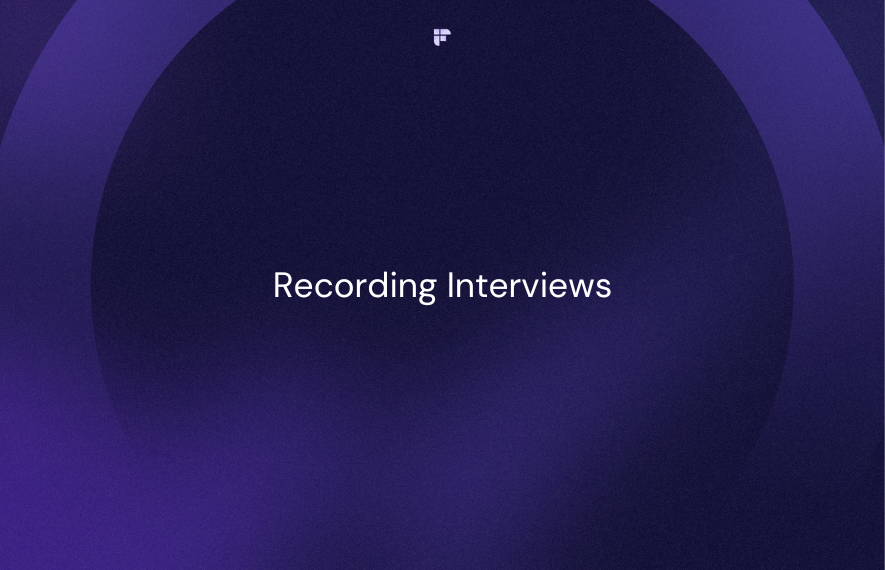
4. Behavioral interview
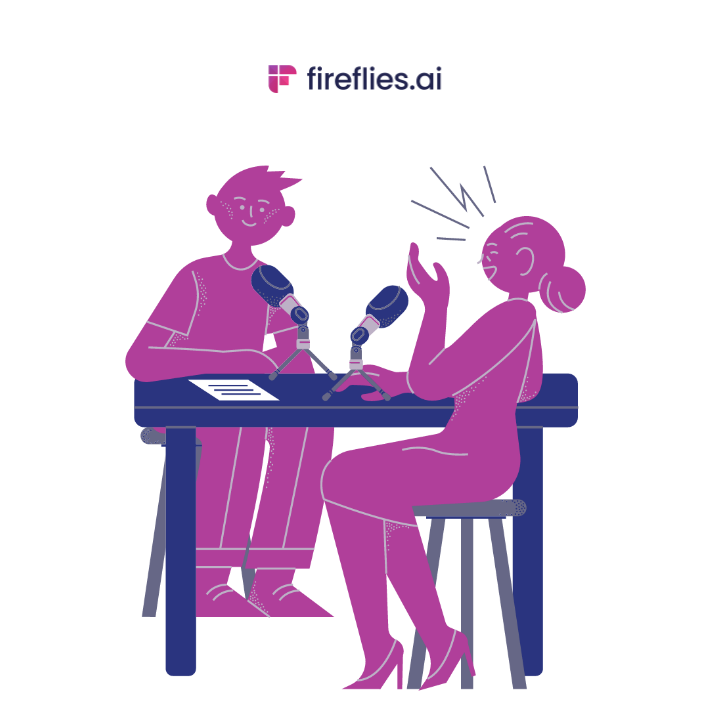
Behavioral interview evaluates past actions to predict future job performance and problem-solving abilities.
The interviewer asks questions requiring the candidate to provide specific examples of how they handled situations in the past, such as dealing with conflicts, solving problems, or demonstrating leadership.
The theory behind a behavioral interview is that past behavior can predict future behavior.
Characteristics
- Focus on past experiences and behavior
- Questions require examples of past situations
- Predicts future performance based on past behavior
When to use
- When you want to predict future job performance based on past behavior
- For jobs that require handling specific situations or working under pressure
- When you need insight into the candidate's problem-solving, decision-making, or conflict-resolution abilities
5. Situational interview
In a situational interview, the interviewer presents hypothetical scenarios to assess the interviewee's decision-making, critical thinking, and adaptability.
Characteristics
- Presents hypothetical scenarios
- Tests problem-solving, decision-making, and communication skills
- Evaluates how candidates handle specific situations
When to use
- When you want to assess how candidates would handle hypothetical situations
- For jobs that involve complex decision-making, critical thinking, or crisis management
- When you want to evaluate a candidate's adaptability and creativity
6. Panel interview

A panel interview is a type of interview where multiple interviewers interact with the interviewee simultaneously.
A panel interview aims to assess the interviewee from different perspectives and provide a more comprehensive evaluation.
Characteristics
- Involves multiple interviewers
- Provides a comprehensive assessment of the candidate
- Interviewers may have different roles or expertise
When to use
- When you need a comprehensive assessment from multiple perspectives
- For high-level or specialized positions
- When different departments or stakeholders are involved in the hiring process
Have you heard of the 40 seconds rule the interviewers follow?
According to it, the selection committee that shortlists candidates for an interview should not spend more than 40 seconds on the application during the screening process.
So, don't spend too much time on an elaborate cover letter; instead, highlight the points that can grab the best attention in the least. In other words, make your application crisp and crystal clear.
7. Group interview
A group interview evaluates teamwork, communication, and leadership skills among multiple candidates simultaneously.
The candidates may be asked to participate in group activities, such as role-playing, problem-solving, or group discussions during the process.
Characteristics
- Multiple interviewees are interviewed simultaneously
- Assesses communication, teamwork, and leadership skills
- Time-efficient evaluation of several candidates
When to use
- When you need to assess multiple candidates simultaneously for teamwork and communication skills
- For jobs that require collaboration, coordination, or leadership
- When you have a large pool of candidates and limited time for interviews
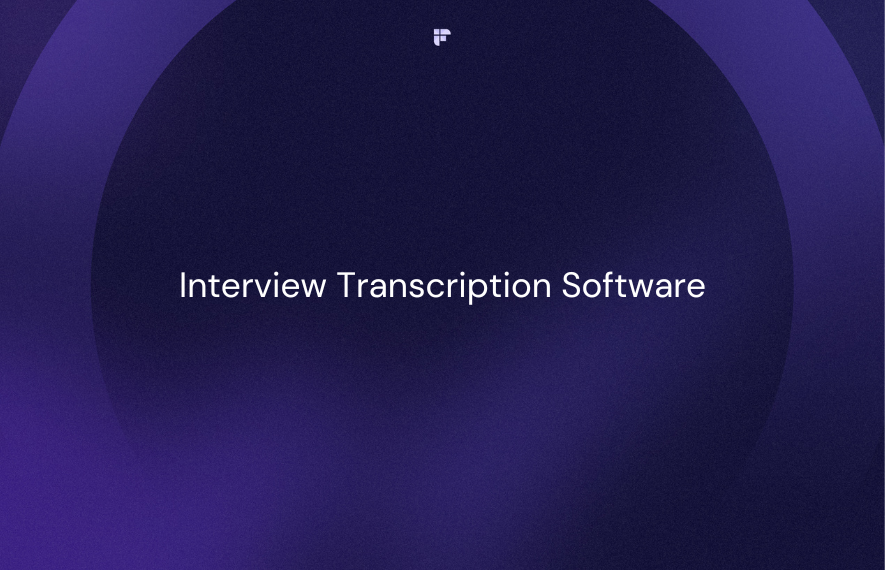
8. Stress interview
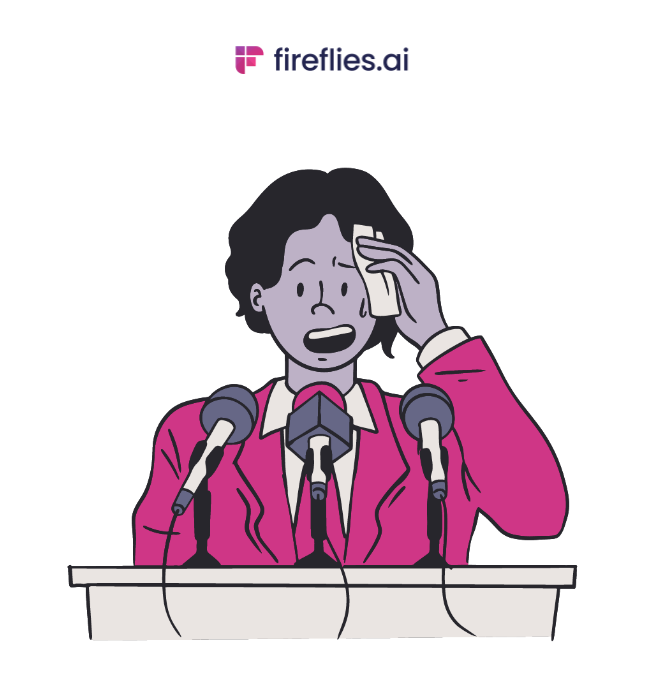
A stress interview is a high-pressure interview that tests a candidate's ability to handle stress and maintain composure.
The interviewer may use aggressive questioning, criticism, or interruptions to create an atmosphere of tension and pressure during the interview.
Characteristics
- High-pressure interview style
- Tests ability to handle stress and different challenges
- May involve challenging questions or an uncomfortable atmosphere
When to use
- When you need to test a candidate's ability to handle stress, pressure, or difficult situations
- For high-pressure or high-stakes positions
- When you want to evaluate a candidate's resilience and adaptability
9. Phone interview
A phone interview is an efficient preliminary screening tool for remote or geographically dispersed candidates.
Phone interviews can be structured or unstructured and may be conducted by a single interviewer or a panel of interviewers.
The advantage of a phone interview is that it allows for more efficient use of time, as the candidate and the interviewer do not have to travel to a physical location.
Characteristics
- Conducted over the telephone
- Often used as a preliminary screening tool
- Saves time and resources for initial candidate evaluation
When to use
- When you need a preliminary screening tool to narrow down a large pool of candidates
- For remote or geographically dispersed candidates
- When you have limited time or resources for in-person interviews
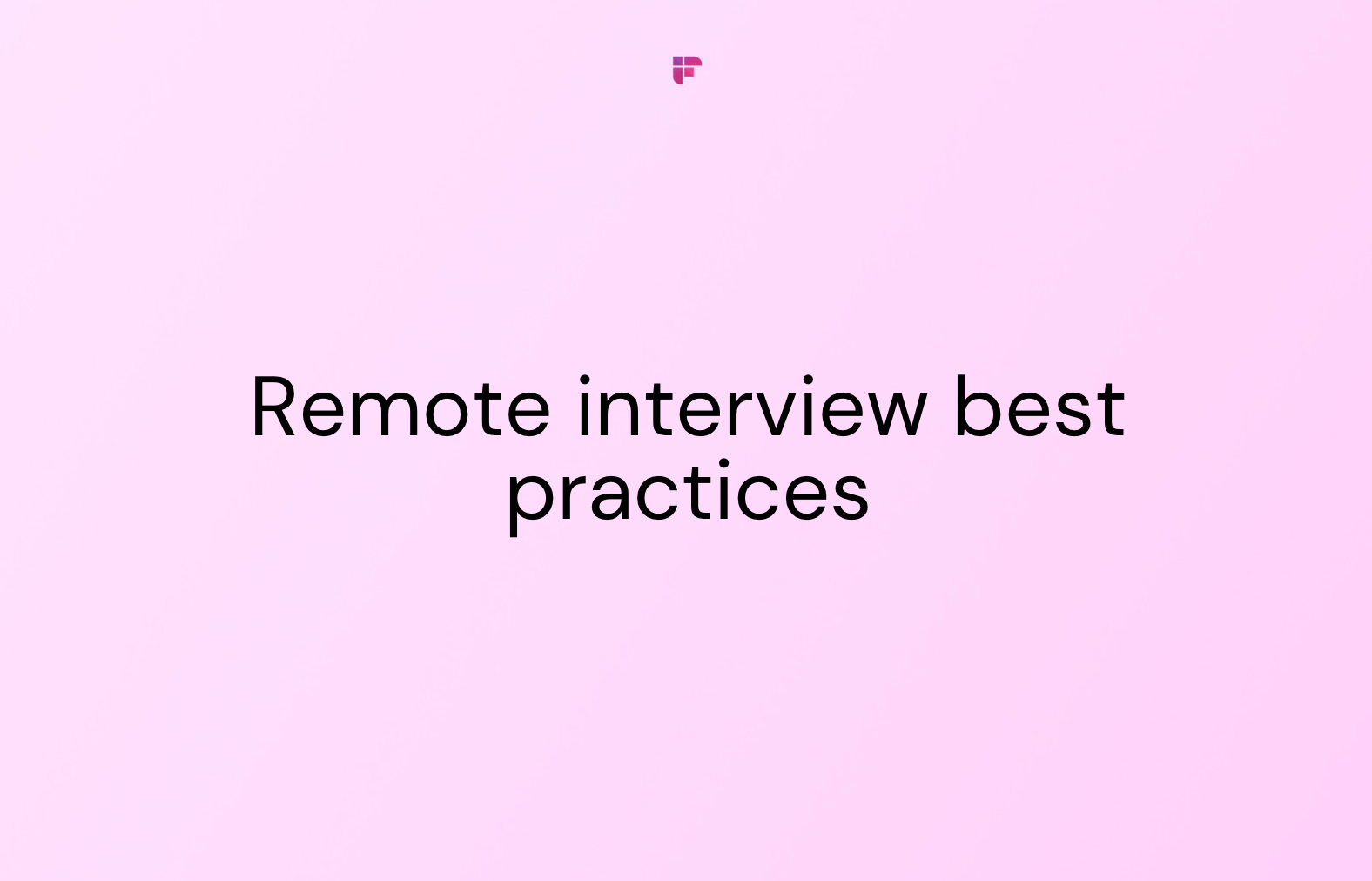
10. Video interview
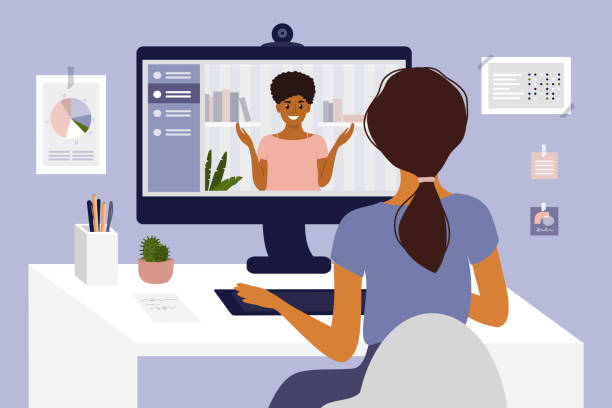
A video interview provides the best remote alternative to in-person interviews, saving time and resources on travel and logistics. It uses video conferencing platforms like Google Meet, Zoom, or Microsoft Teams.
Characteristics
- Conducted through video conferencing platforms
- Allows for remote interviewing
- Can be used as a screening tool or as a replacement for in-person interviews
When to use
- When you need to conduct interviews remotely due to location or safety concerns
- For initial screening or as a replacement for in-person interviews
- When you want to save time and resources on travel and logistics
11. Job simulation or case interview
A job simulation or case interview is a type of interview that evaluates a candidate's problem-solving, analytical, and decision-making skills.
In a job simulation or case interview, the candidate gets a hypothetical scenario or problem related to the job they are applying for. The candidate has to analyze the situation, identify the key issues, and propose a solution or a course of action.
Characteristics
- Involves completing a task or solving a problem related to the job
- Directly assesses skills and abilities related to the position
- Provides insight into the candidate's performance on the job
When to use
- When you need a direct assessment of a candidate's skills and abilities related to the job
- For technical or specialized roles that require specific knowledge or expertise
- When you want to see how a candidate performs in a real-world or hands-on scenario

How Fireflies.ai can assist with different types of interviews
Fireflies.ai is an AI-powered meeting assistant that can record, transcribe, summarize, and analyze your interviews and make it easier.
Many podcasters, interviewers, and recruiters use Fireflies to save time, reduce the risk of human error, and get quantifiable insights from their interviews.
Here's how Fireflies.ai can assist you with different types of interviews:
1. Automatically record and transcribe interviews with 90% accuracy
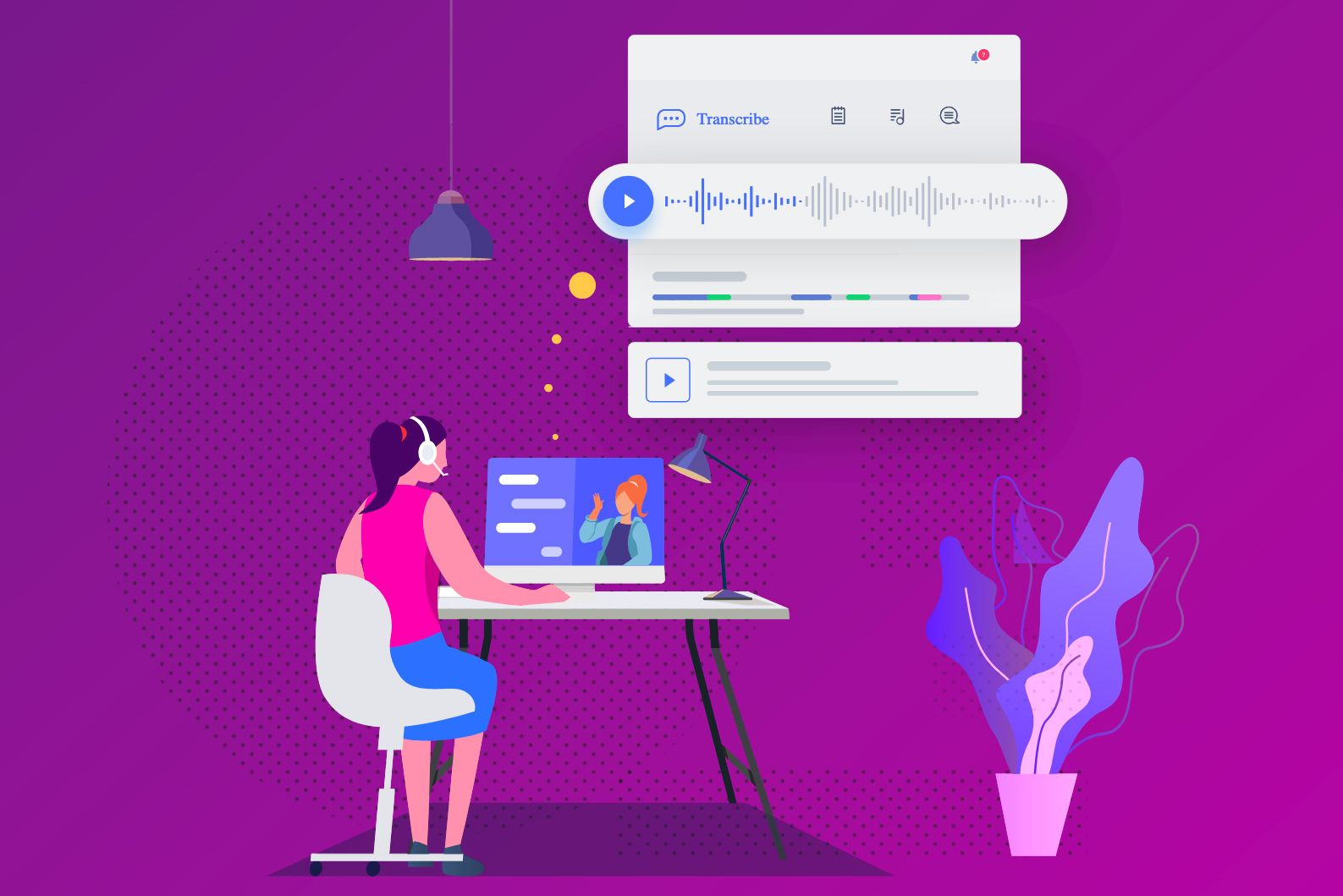
Fireflies.ai can automatically record, transcribe, summarize, and analyze interviews with 90% accuracy. If you’re conducting interviews online and have a Fireflies account, simply invite [email protected] to join the meeting as a silent attendee and take notes of it.
Alternatively, you can change the Fireflies settings, enabling the bot to join your meetings automatically.
If your interview is in-person, record and upload the conversation to Fireflies to get a transcription, summary, and analysis. Fireflies can transcribe meetings and audio files in 30+ languages.
Fireflies offers the highest security for all your data. Your transcript is encrypted both at rest and in transit. Also, Fireflies is SOC 2 Type 2 and GDPR compliant.

2. Provides best-in-class AI-generated super summary of your meetings
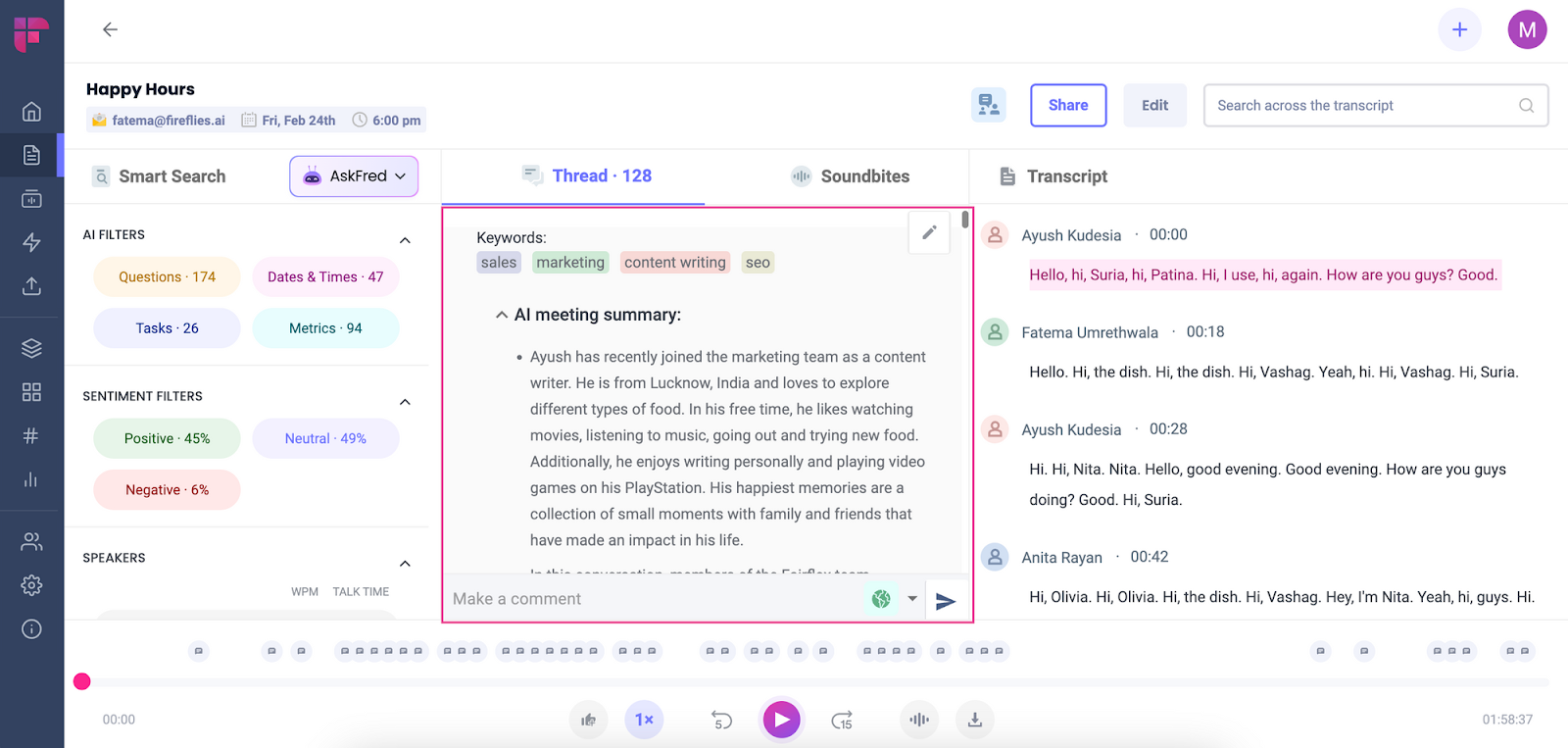
Instead of reading through an entire transcript or listening to the recording, you can refer to the high-level super summary to get a gist of your interviews.
This super summary includes:
- Most important keywords spoken during the meetings
- A meeting overview to quickly grasp the context of the conversation
- A meeting outline with timestamps
- Bullet points notes of key highlights
- Action items
3. Facilitates effortless tracking of action items
Fireflies can detect and track action items mentioned during the interview, such as scheduling follow-up meetings, checking references, or sending additional information to the candidate.
It will then automatically send the meeting recap to all meeting attendees. This keeps all the task assignees updated and accounted for their responsibilities. This way, you can easily reduce follow-ups, stay organized, and ensure that important tasks are not overlooked.

4. Eases searching and organizing interview content
Fireflies offers a global search feature that lets you search key terms or phrases across all your meetings.
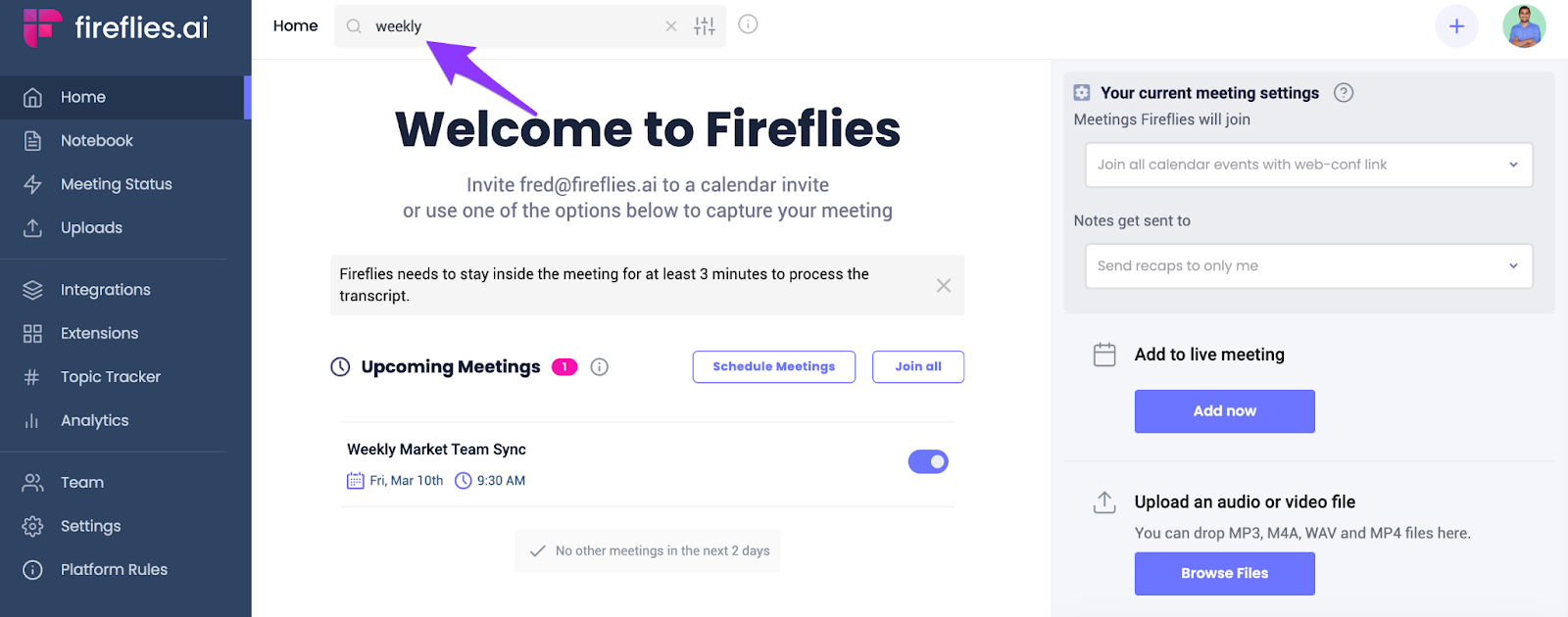
Additionally, you can search for information within each meeting transcript and use advanced capabilities like Smart Search to review interviews in minutes.
With Smart Search, you get:
- AI Filters: track down action items, dates, tasks, questions, etc., quickly.
- Topic Tracker: track, organize, and search your interview data faster and better.
- Sentiment Analysis: identify the positive, negative, and neutral sentiments from your interviews
Explore these features to sift through all the important details of your interviews quickly.

5. Enhances collaboration with your team
Based on your meeting settings, Fireflies automatically shares the interview notes, recording, and summary with other attendees.
On top of this, Fireflies offers advanced collaboration features like Threads and Soundbites.
- Threads: Comment, like, and interact with your teammates within the transcript.
- Soundbites: Create shareable audio snippets from the highlights of your interviews.
- Playlist: Create a collection of soundbites in a single space from multiple calls.

6. Offers conversational intelligence to analyze interview data

Fireflies' conversational intelligence can provide insights and analytics on your interview data—speaker sentiments, talk-to-listen ratio, longest monologues, time spent in meetings, and more.
You can use this to identify patterns, trends, or areas for improvement in your interview process.
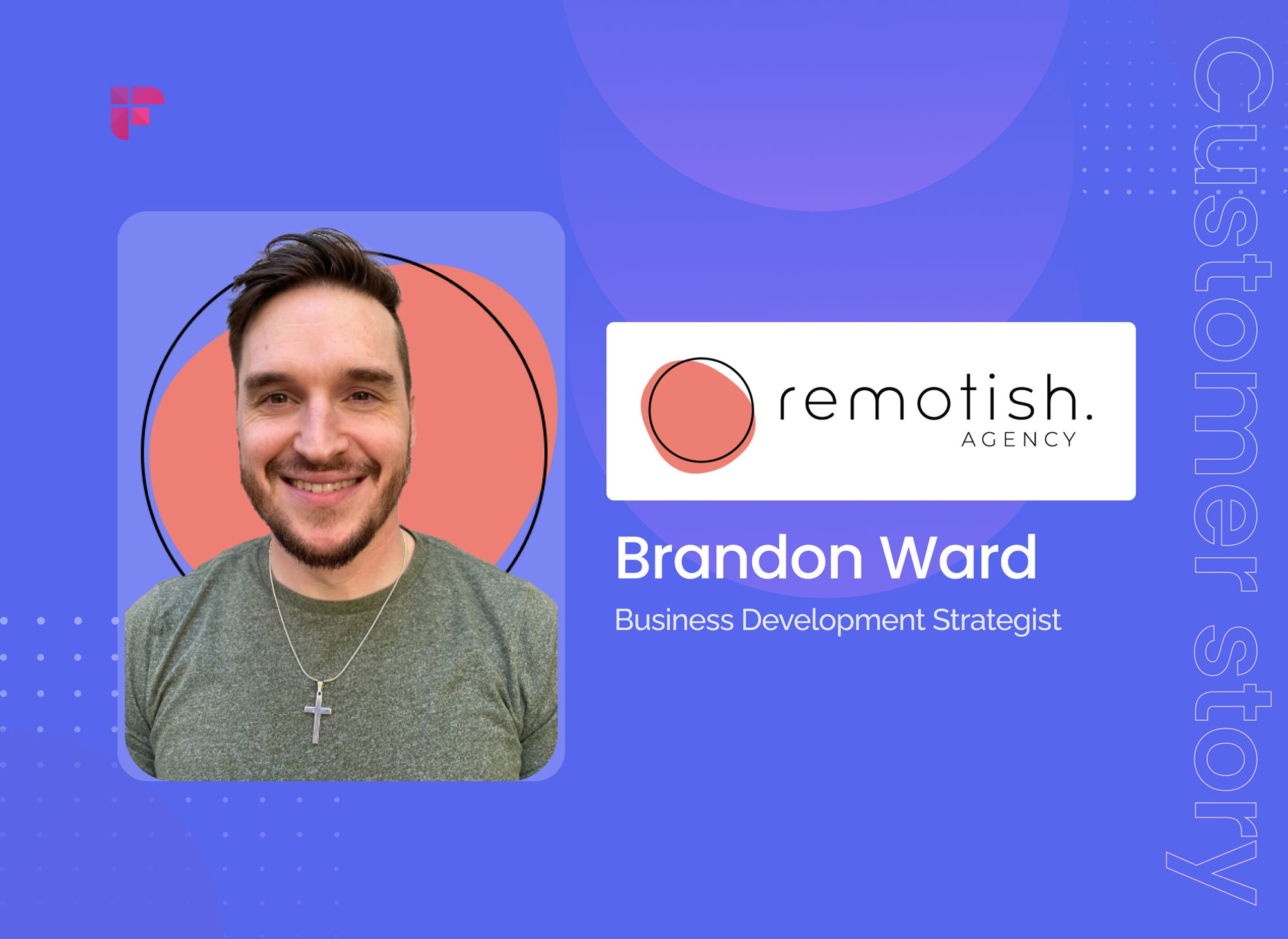
7. Helps create a knowledge vault of all your conversations
Fireflies seamlessly integrates with around 50 video conferencing and productivity tools like Zoom, Aircall, Slack, HubSpot, Salesforce, etc.
So no matter where the information is discussed, you can easily integrate it with your favorite apps and effortlessly create a powerful knowledge vault of all your conversations with just one tool, Fireflies.
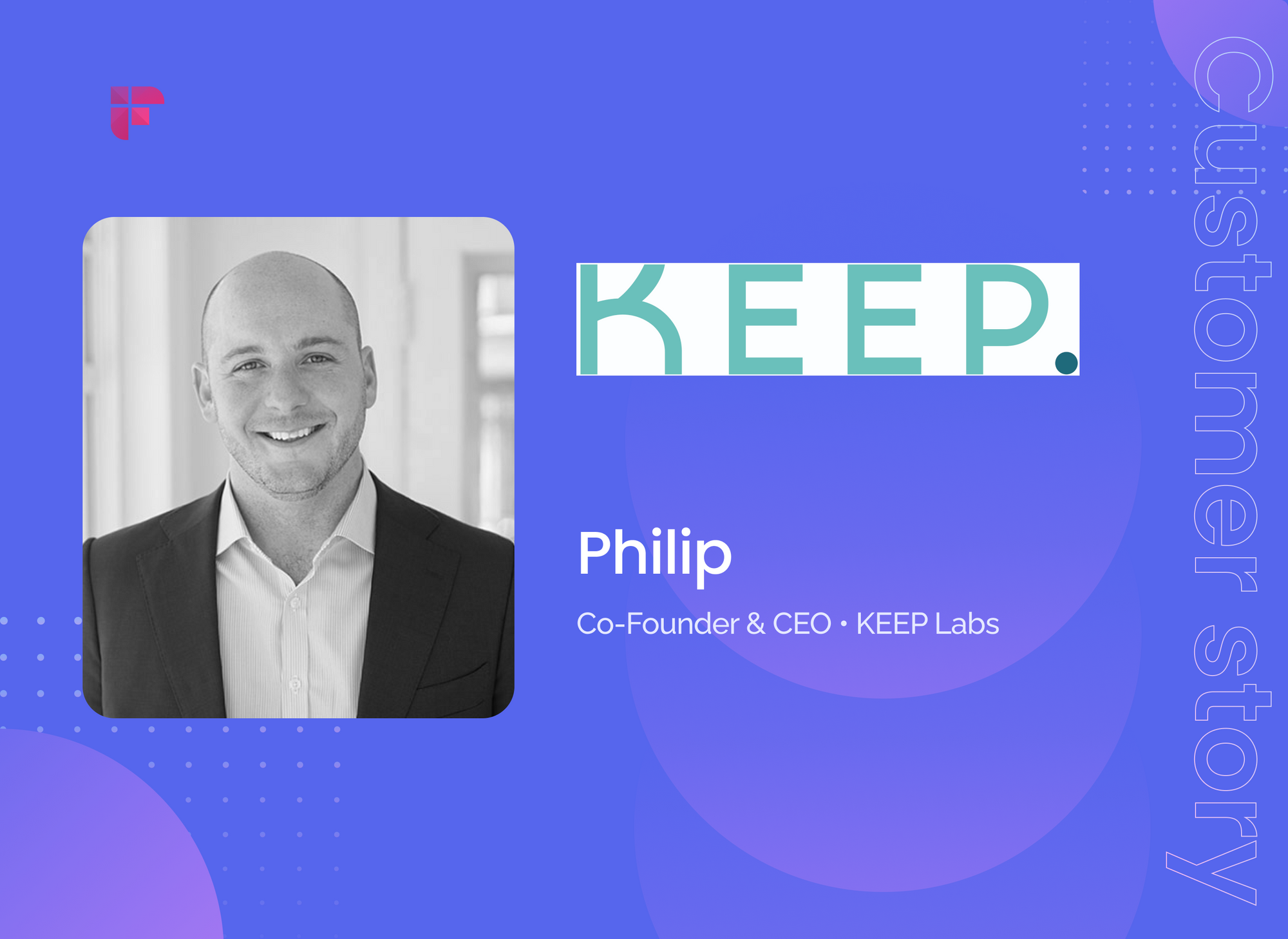
8. Provides chatbot assistance
Fireflies chatbot, AskFred, brings the power of ChatGPT into meetings. It can answer any questions you have about the conversation; all you need to do is simply ask, just like you chat with a friend.
It can also automatically develop other forms of content, like social media posts, emails, blog posts, etc., from your conversations.
In conclusion,
Understanding the various types of interviews and their unique characteristics is essential for selecting the right approach to suit your needs. From structured to unstructured interviews, and more specialized methods like behavioral or situational interviews, each type serves a specific purpose and can provide valuable insights.
Carefully consider your goals and choose the right method. And leverage tools like Fireflies to ease the entire process and make informed decisions faster.
Also, crack the perfect balance between asking the right questions and fostering an engaging conversation. Happy interviewing!

